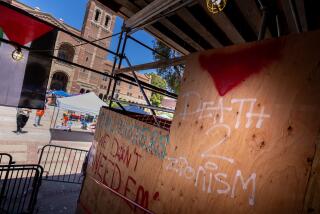In Jerusalem, an Educator in Tolerance Gets a Campus
- Share via
JERUSALEM — In the fierce tug of war between religious and secular Jews here, there is almost no middle ground.
Ultra-Orthodox scholars claim to have cornered the market on truth, while secular Israelis say they have no use for musty religious texts and outmoded tradition.
Rabbi David Hartman hopes the 2 1/2-acre campus of the Shalom Hartman Institute, inaugurated here over the weekend, will provide a middle ground--physically and spiritually.
Hartman--who has been working for two decades to foster dialogue among Muslims, Christians and Jews as well as to bridge the growing chasm between secular and religious Israelis--has founded a permanent home for this endeavor to put pluralism on the map of the Holy City.
“This campus proclaims we are part of the landscape of Jerusalem. We’re not the wandering Jews of Jerusalem anymore,” Hartman said Sunday at the end of the four-day opening ceremonies. “We are offering Israel and the world a vision of inclusiveness, of diversity of faiths and people of the world. We are struggling to overcome the single-truth obsession.”
This is not an easy task in a country that speaks in extreme terms and produces zealots. In the land of the Bible, Hartman said, “people think they’re prophets.” But passion need not be synonymous with fanaticism, he added.
The crowds at Hartman’s inaugural lectures showed just how difficult a task he faces. They consisted mostly of secular Israelis and modern Orthodox Jews. There were few, if any, Palestinians or black-hatted ultra-Orthodox Jews.
“There is no real culture of interchanges between Jews and Muslims,” Hartman said. “We are speaking to Israelis, to secular Jews in Israel and religious Zionists who want to embrace the modern world.”
Hartman’s broad views challenge those of the ultra-Orthodox Jews, or haredim. While his training is Orthodox and he sticks to original Jewish texts, his institute is open to Reform and Conservative as well as secular Jews. Men and women study Talmudic texts together, and women may become teachers of the texts--unheard of among the haredim.
The institute promotes democracy, pluralism and tolerance for other religions--issues that are not of concern to the haredim--at its Jewish studies center, teacher training center and experimental high school for boys.
“This is the first place I ever heard John Stuart Mill, Maimonides and Spinoza discussed in the same place,” said Rabbi Chaim Seidler-Feller, director of the Hillel Jewish Student Center at UCLA, who has studied at the Hartman institute.
“The institute is asking questions in both directions. It asks the religious to accommodate democracy and the secular to accommodate tradition. It asks how to charge ahead in the modern world and remain religious,” he said.
Former Mayor Teddy Kollek’s Jerusalem Foundation provided land worth about $17 million for the new campus, which borders Jerusalem’s German Colony and Talbieh neighborhoods. Private donors paid for the $10-million construction.
The campus architecture tries to combine Greek, Jerusalem Old City and contemporary styles. The library, study hall and offices have picture windows meant to express the institute’s openness to the world.
The U.S.-born Hartman, whose raised eyebrows and wide grin give him a devilish look, moved to Israel from Canada in 1971 and founded the institute five years later, naming it for his father, who was born in Jerusalem’s Old City.
But as Hartman’s influence has grown stronger, so have the number of haredim and their political power in Jerusalem. About 30% of Jerusalem’s 420,000 Jewish residents are haredim, and demographers say that figure will rise to more than 40% in the next 15 years.
Battles between religious and secular residents have grown increasingly bitter over such issues as the closing of streets on the Sabbath, the sale of pork and women’s dress.
The electoral defeat of Hartman’s patron, Kollek, three years ago was due in large part to the haredim, who now control key committees on the City Council.
Menachem Friedman, an expert on the ultra-Orthodox at Bar Ilan University in Tel Aviv, said that “in a situation where the relations between secularists and religious people are increasingly problematic, anyone who promotes tolerance is important.”
More to Read
Sign up for Essential California
The most important California stories and recommendations in your inbox every morning.
You may occasionally receive promotional content from the Los Angeles Times.













